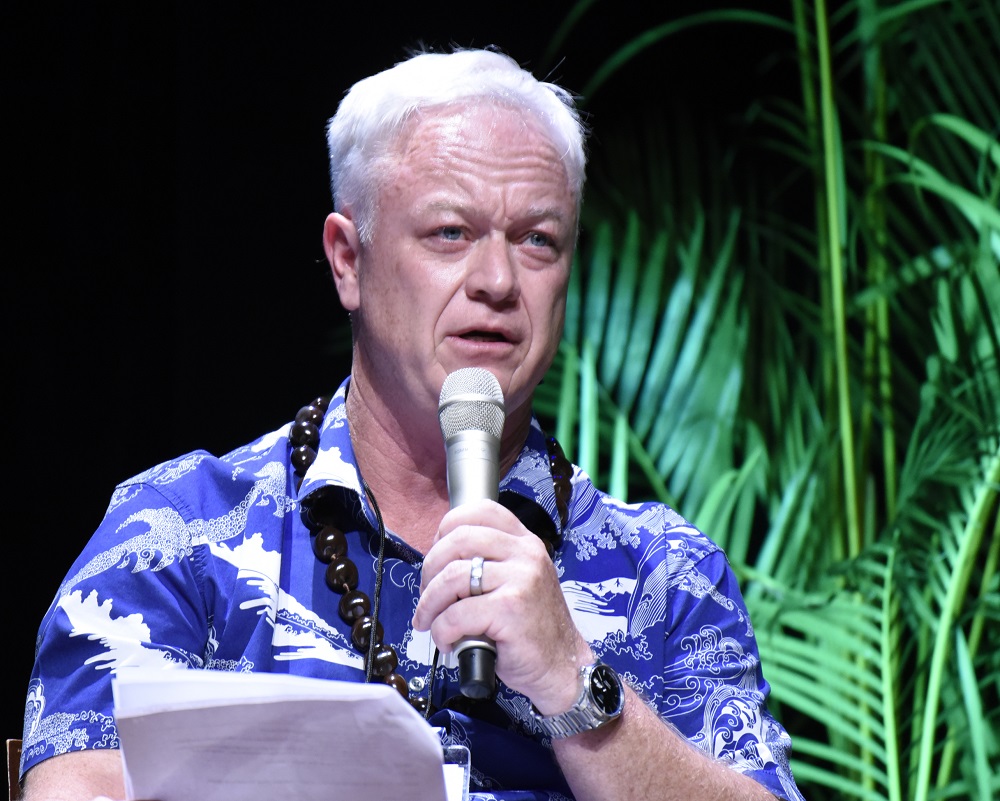
by HEC Team | Feb 23, 2018 | 2018, News
In March, the Maui Energy Conference will be discussing the business opportunities created by efforts to decarbonize. An extraordinary decision on February 6, 2018 by the Hawai’i Public Utilities Commission (PUC) shows why you need to attend if you are interested in the Hawaii energy scene. According to the Hawaii PUC the issues relevant to a review of projects by the local gas utility now include:
…whether the commission should disallow as unreasonable…costs due to the effect …of imported LNG on the State’s reliance on fossil fuels and greenhouse gas emissions.” Docket No 2017-0150.
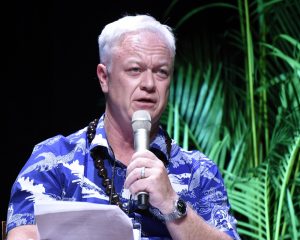 This looks like a fundamental shift in how the Commission assesses the environmental impacts of producing energy in Hawaii. According to Conference Chair Doug McLeod: “The question is now whether the traditional ‘reasonable and prudent standard’ drives one to the conclusion that prudent people don’t want to make electricity in ways that might speed up climate change”. Sea change, game change, whatever type of change analogy you like – from a regulatory standpoint this is very different than where we were a few years ago.
This looks like a fundamental shift in how the Commission assesses the environmental impacts of producing energy in Hawaii. According to Conference Chair Doug McLeod: “The question is now whether the traditional ‘reasonable and prudent standard’ drives one to the conclusion that prudent people don’t want to make electricity in ways that might speed up climate change”. Sea change, game change, whatever type of change analogy you like – from a regulatory standpoint this is very different than where we were a few years ago.
Don’t miss the first organized discussion of this important issue in Hawaii and its possible implications nationwide. The Maui Energy Conference, March 14-15th, will be held at the Maui Arts and Cultural Center.
The Maui Energy Conference is Hawaii’s leading energy conference featuring invited keynote speakers, panel sessions, case studies, exhibits and networking. It attracts more than 300 energy industry leaders from Hawaii, the Mainland, Japan and Europe to exchange ideas on how to better serve customers in today’s rapidly changing power generation and delivery environment.
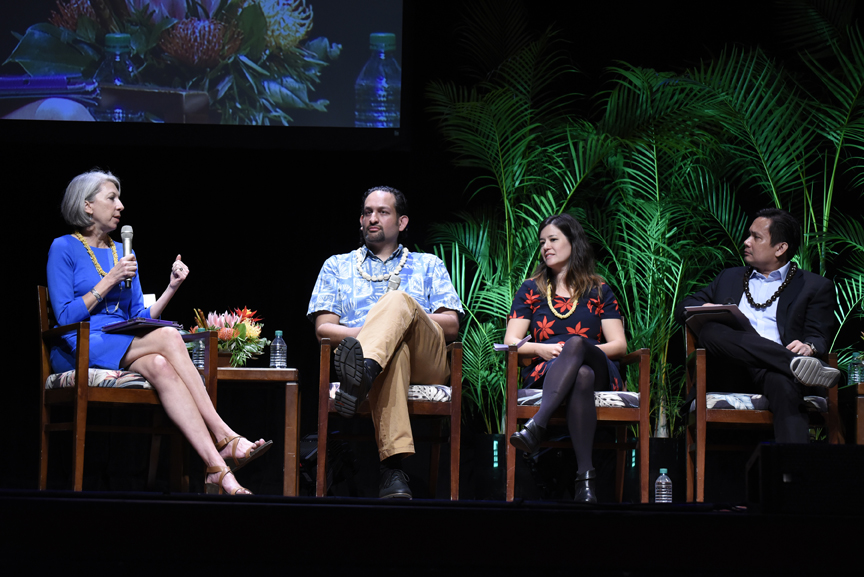
by HEC Team | Jan 8, 2018 | 2018, News
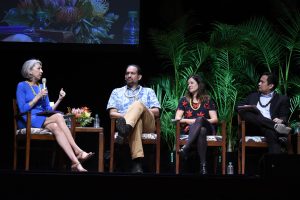
Creating a Resilient Energy Economy Panel L to R Cheryl Roberto, Kush Patel, Aki Marceau and Moderator Luis Salaveria of DBEDT.
KIHEI, Maui, Hawaii – Jan 8, 2017 – The 2018 Maui Energy Conference returns to the Maui Arts Cultural Center March 14-15, celebrating its 5th Anniversary and the 10th Anniversary of the Hawaii Clean Energy Initiative. The event, presented by the Maui Economic Development Board (MEDB) and supported by the Mayor’s Office of Economic Development, is Hawaii’s leading energy conference and will explore the theme ‘Decarbonization: A Business Opportunity for Innovative Communities.’
“Hawaii led the way in setting a 100% Renewable Portfolio Standard (RPS) but did we set the right targets if we define renewable energy in a way that does not include carbon?” queries Conference Program Committee Chair Doug McLeod. “We will be looking at what we can learn from energy leaders across the nation and from around the globe.”
The Annual Maui Energy Conference attracts more than 300 energy industry leaders from Hawaii, the Mainland, Japan and Europe to exchange ideas on how to better serve customers in today’s rapidly changing power generation and delivery environment.
The conference program features invited Keynote speakers, panel sessions, case studies, exhibits and networking. With the 10-year anniversary of the Hawaii Clean Energy Initiative (HCEI), speakers will be answering the questions on its limits. whether it addresses carbon and whether there is a worthy successor.
Ever heard of Carbon Farming? A panel will discuss what the Carbon Farming Task force has been up to and the implications for Maui and Hawaii.
“Decarbonization presents innovative communities, from Hawaii to New York, with new business opportunities,” added Frank De Rego Jr, Director of Business Development Projects at MEDB and Vice-Chair of the Program Committee. “We want to know if there is a viable market for carbon and how do we maximize innovation and investment in the pursuit of a carbon-free environment.”
Session topics explore the theme at a policy and regulatory level as well as business with a session on Convergence looking at how it all comes together for a shared solution that benefits all stakeholders. Other topics include: Decarbonizing Transportation; Regulating Carbon: The Best Solutions; Storage Technologies……and More.
The Program Committee includes energy experts from Maui, Oahu, Colorado, and California and welcomes new member Frederick Redell, Energy Commissioner, Maui County Office of Economic Development.
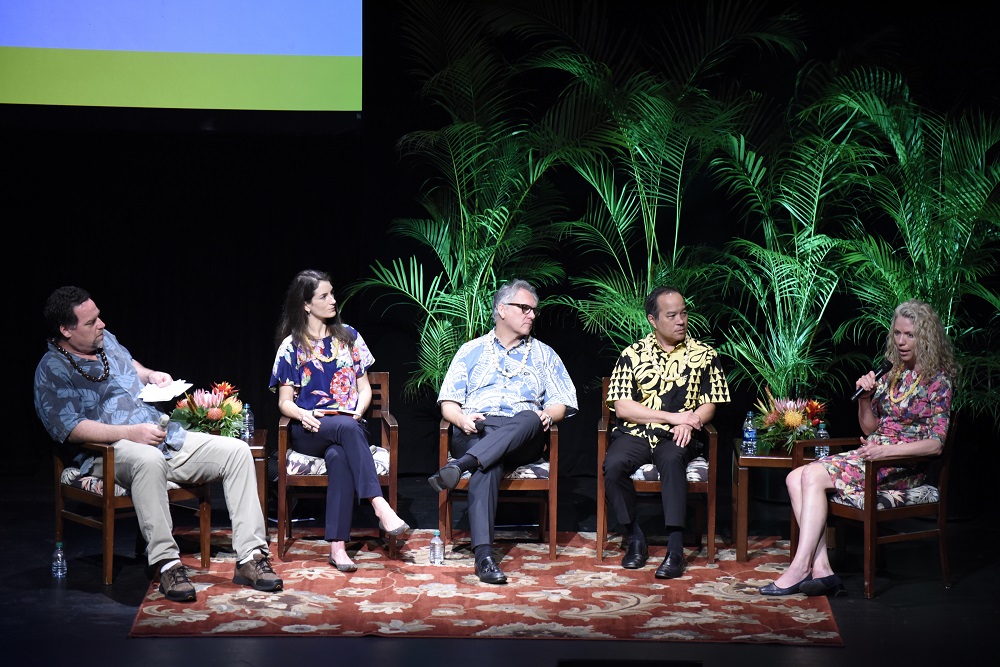
by HEC Team | Dec 20, 2017 | 2018, News
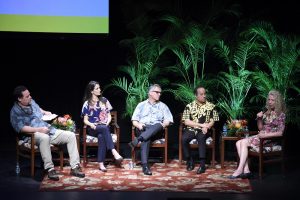 With the program for the 2018 Maui Energy Conference taking shape, we can share some more details with you.
With the program for the 2018 Maui Energy Conference taking shape, we can share some more details with you.
Here are some of the topics to be explored at the 5th Annual Maui Energy Conference March 14 – 15, 2018 as we celebrate the 10 year anniversary of the Hawaii Clean Energy Initiative.
The Limits of the Hawaii Clean Energy Initiative
The Hawaii Clean Energy Initiative (HCEI) has made claims to be a catalyst for significant strides in renewable energy, but there are lingering questions. What exactly is HCEI? What are its limits? Does it address carbon? Is there a worthy successor?
Business Opportunities Created by HCEI
What have we learned about nurturing business opportunities in the renewable energy sector? What are the hit and misses involving utility scale and distributed renewable resources? Is there a viable market for carbon?
The Entrepreneur Investor Relationship
How do we maximize innovation and investment in the pursuit of a carbon-free environment? What opportunities exist to connect investors and entrepreneurs in the pursuit of a common goal for decarbonization? What disruptive technologies are on the horizon that provide an opportunity for investment (e.g. data technology, hydrogen, storage technologies)?
And Much More!
The Maui Energy Conference provides an opportunity to learn from thought leaders about key issues in the energy industry and to connect, collaborate and forge new partnerships.
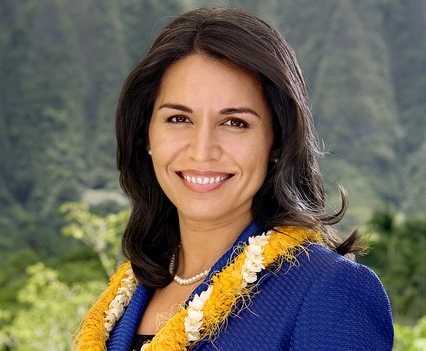
by HEC Team | Sep 8, 2017 | News
September 6, 2017
Press Release
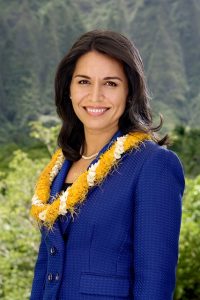
Congresswoman Tulsi Gabbard (HI-02)
Washington, DC—Congresswoman Tulsi Gabbard (HI-02) recently introduced H.R. 3671, the Off Fossil Fuels for a Better Future Act (OFF Act), which will put the United States on a pathway to replace fossil fuels with 100 percent clean energy generation and use by 2035. This legislation eliminates tax giveaways to the fossil fuel industry, and provides support to transitioning workers who will be impacted by this generational change.
Rep. Tulsi Gabbard’s bill builds on progress made in Hawai‘i and other states that have committed to address the climate change crisis head on and do everything possible to transition to a 100 percent clean energy economy. The OFF Act continues this progress and sets an ambitious timeline to cut carbon emissions by ending America’s reliance on fossil fuels by 2035 in order to avert some of the most devastating impacts of climate change. Transitioning to clean energy will stimulate our economy, support our working men and women, and protect our environment. It will increase our competitiveness by investing in clean energy technologies, jobs, and training programs. Additionally, it will improve the health and well-being of the American people and our planet from toxic pollutants, asthma and respiratory illnesses, and environmental degradation.
Congresswoman Gabbard’s OFF Act is currently supported by environmental advocates and original co-sponsors including Rep. Jamie Raskin (MD-08), Rep. Barbara Lee (CA-13), Rep. Nanette Barragán (CA-44), Rep. Ted Lieu (CA-33), Jan Schakowsky (IL-9), and Keith Ellison (MN-05) and has been endorsed by over 100 clean energy, climate change, and environmental justice organizations.
Congresswoman Tulsi Gabbard Stated:
“Through extreme weather events, dramatically rising sea levels, negative impacts on our environment, and record high temperatures, we continue to see the devastating consequences of climate change. My home state of Hawai‘i has experienced this directly through record-breaking sea levels, high surf that has eroded land beneath homes and made roads impassable, and rising ocean temperatures that have dramatically altered marine life and destroyed our coral reefs. Hawai‘i has led by example as the first state in the nation to adopt a 100 percent clean energy goal. It’s long past time for the federal government to take action for the sake of our people, our planet, and our future.
“All across the country, industrial cities, coastal communities, and urban neighborhoods have been most impacted by the negative effects of years of pollution, stagnating wages, and unemployment. These communities are being hardest hit by increases in illness and disease, economic hardship, and food shortages. Twenty-first century problems demand twenty-first century solutions. By investing in green technologies and ending corporate hand outs to the fossil fuel industry, we can grow the economy, create good jobs, and protect our environment. The promise of a clean energy economy is one of skilled, good-paying jobs, advanced and sustainable infrastructure, and clean and safe neighborhoods.
“The transition to a 100 percent clean energy economy will not be easy. We must work together to address the challenges we face by listening to people in all sectors of the economy to build the path forward that will help our country end our dependence on fossil fuels and build a bridge to a clean energy future. It will take a commitment from both the public and private sector to work with energy companies, utilities, and transportation and industrial businesses to deploy the energy technologies that will transform our existing energy infrastructure today, while developing cutting edge solutions in the decades leading up to 2035. If the federal government does not act now and bring people together to solve this challenge, we will fail to protect future generations of Americans from the devastating economic and environmental consequences of climate change.
“We must do all we can to end our addiction to fossil fuels and deploy the technologies that will put America on the path toward a clean, sustainable energy future today and in the years to come. I call on my fellow lawmakers, and all Americans, to support the OFF Act to protect the people and our planet by committing to a 100 percent clean energy economy.”
State and national organizations supporting the OFF Act had the following to say:
“Rep. Gabbard is a leader in the environmental movement and we are grateful for her leadership on this important issue. Climate change disproportionately affects the poor and communities of color and we must fight for climate justice for all those who are harmed by fossil fuels and industrial pollution. We need every member of Congress to sign onto this, and all legislation, that seeks to protect our land, air, and water for generations yet unborn.” – Sen. Nina Turner, President, Our Revolution
Progressive Democrats of America is proud to strongly support Congresswoman Tulsi Gabbard’s groundbreaking climate justice bill, the Off Fossil Fuels for a Healthy Future Act. As caretakers and protectors of our planet for future generations, we need standards that rise to the severity of the climate emergency. Rep. Gabbard’s bill moves us ever closer to the kind of climate justice that must be achieved with a sense of urgency and clarity.” – Donna Smith, Executive Director, Progressive Democrats of America
“Environmental Justice and Climate Justice communities and workers deserve better and more than an economy that continues to dig, burn, and dump in their backyard in spite of extreme climate threats. It is time to wake up as a nation and come together to set a visionary Just Transition away from fossil fuels that are polluting our neighborhoods, Tribal territories, and are leading to levels of CO2 that are already creating climate catastrophe for those at the frontlines in the US and the Global South. We need greater reinvestments and sustainable control of energy by communities, viable opportunities for workers, and a plan to move away from market-based solutions and corporate subsidies that reward dangerous behavior by the very industries that are suppose to meet our needs. We thank Rep. Gabbard for being a trailblazer in supporting a vision for a future we can all thrive in.” – Angela Adrar, Executive Director, The Climate Justice Alliance
“Firm science shows that to have any reasonable chance of avoiding climate chaos, we must transition away from fossil fuels immediately and aggressively. Much progress needs to be made in the next decade, and the transition must be complete by 2035. Congress Member Gabbard’s Off Fossil Fuels for a Better Future Act would mandate this rapid energy revolution, and we’re proud to be working with her to move this critical legislation forward. This bill is the strongest, most ambitious climate and energy legislation ever introduced, but more importantly, it’s the only bill that sufficiently addresses the climate crisis we face.” – Wenonah Hauter, Executive Director, Food and Water Watch
“The crises of climate change and economic inequality are intertwined, and must be solved in tandem. The Off Fossil Fuels for a Better Future Act does just that, creating jobs, cleaning up the environment in the most impacted communities, and taking the bold action needed to avert climate catastrophe.” – Jordan Estevao, Senior Strategist, People’s Action Institute
“The Off Fossil Fuels for a Better Future Act is a bold and necessary federal action that rightly connects our nationwide dependence on dirty energy to economic stagnation, public health threats, and pointless environmental degradation. Climate change is here, and we simply can’t remain wedded to the old ways, ways that never worked for the most vulnerable among us. This bill puts justice at the center and provides a timely roadmap for an affordable, livable, and equitable future.” – Tamara Toles O’Laughlin, Executive Director, Maryland Environmental Health Network
“We are entering a climate emergency with grave effects on public health and safety and the future of society as a whole. The urgency of the need for this legislation couldn’t be more clear to direct care nurses who deal with the human fallout of fossil fuel pollution and its effects on the planet. NNU members stand united with our communities and the climate justice movement in support of this bill.” – Jean Ross, RN, Co-President, National Nurses United
“Many of the same activities which are a threat to the climate are also a threat to human health. Auto exhaust specifically has been identified by the Institute of Medicine and other groups as probably contributing to the increased risk of breast cancer. By requiring a shift to zero-emission vehicles and putting a moratorium on new major fracking and dangerous drilling projects, the OFF Act will help protect public health and reduce exposures to chemicals that may increase the risk of breast cancer.” – Karuna Jaggar, Executive Director, Breast Cancer Action
“The race to a 100 percent fossil fuel free existence is one that we cannot afford to lose. This race is further challenged by variables that contribute to and exacerbate climate disruption; racial, economic, ethnic and gender/gender ID injustice. The OFF act is a proactive tool to assist us in completing this race efficaciously, while removing insouciant approaches to uplifting and protecting our most marginalized communities and populations. Further, OFF’s approach to ensuring protection for workers who will be displaced as we rapidly wean ourselves off fossil fuels highlights the difference between a Just Transition and just a transition. We need to bust single issue silos and approach the climate crisis through an intersectional lens, OFF comprehends this idea and moves us in the right direction towards forging and sustaining a massive and inclusive movement.” – Anthony Rogers-Wright, US Coordinator, The Leap
“It is time for the United States to break free from its addiction to extreme energy. Science and traditional Indigenous knowledge knows that the only direct way to do that is a rapid just transition to sustainable, renewable energy. It’s time for us as human beings, to get back into balance with Mother Earth and Father Sky.” – Dallas Goldtooth, Campaigner, Keep It In The Ground Campaign, Indigenous Environmental Network
“The DER Council applauds Congresswoman Tulsi Gabbard’s support for a clean energy economy and a fossil-free future for our Country. Once again, Hawaii leads the way for renewables.” – Leslie Cole-Brooks, Executive Director, Distributed Energy Resources Council of Hawaii
“Rep. Gabbard’s Energy proposal is an in-depth and comprehensive plan to move the US into an economically strong, culturally inclusive global leadership position on energy. This bill properly addresses Environmental Justice, sustainability, indigenous rights, and respect for other countries and people impacted by the fossil fuel appetite of the US. Now more than ever America needs to step up and again commit to the elimination of fossil fuels for the benefit of future generations. Mahalo Tulsi!” – Bob King, President, Pacific Biodiesel Technologies
“Clean energy is our future. Setting a 100% renewable energy policy ensures that America does not cede that future to other countries. When Hawaii set a goal for 100% renewable energy it was at first viewed as impossible and then accepted as aspirational. Today, the utility plans to achieve the goal five years ahead of schedule at a cost that is billions of dollars less than using fossil fuel energy. Building our clean energy future helps create an economy that supports us while protecting a planet that sustains us. Blue Planet Foundation applauds Congresswoman Gabbard’s leadership on this critical issue. Establishing a target for 100% clean energy for America is the vision we need today for a sustainable tomorrow. It’s time for America to make that commitment to future generations that we are serious about solving our climate crisis.” – Jeffrey Mikulina, Blue Planet Foundation
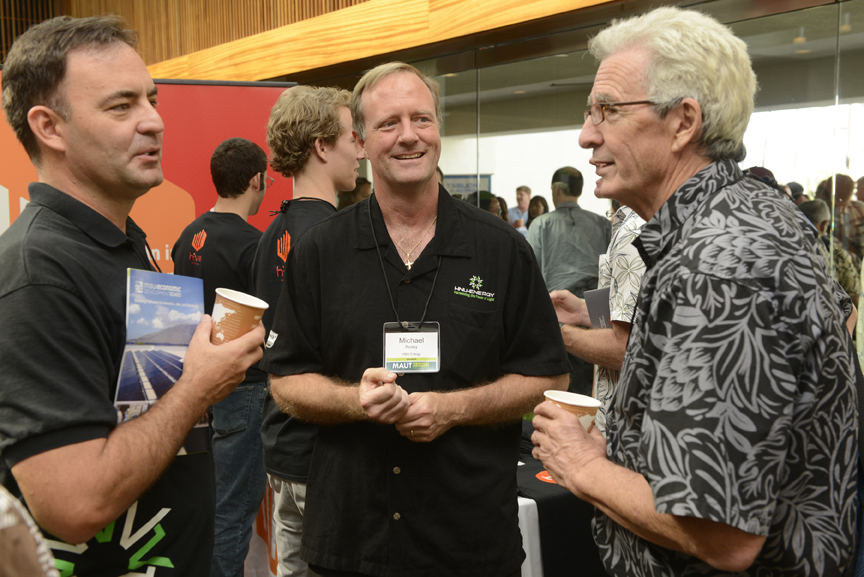
by HEC Team | Apr 11, 2017 | 2017, News
The Maui County Office of Economic Development and the Maui Economic Development Board wrapped up a successful 2017 Maui Energy Conference on Friday, March 24 with record-breaking attendance. The Conference attracted 380 participants, 50 speakers and 26 sponsors &/or exhibitors from Hawaii, the Mainland U.S.,Japan, Germany and Spain.
Below is a list of articles published by the press.
DURING AND POST-CONFERENCE
Maui Energy Conference reports record-breaking attendance this year – Pacific Business News
Why Hawaii Must Become More Energy Resilient – Honolulu Civil Beat
2017 Maui Energy Conference: Discussing Hawaii’s Transition to a Clean Energy Economy – Medium.com
Panelist: ‘Food, water and energy must all intersect in agriculture’ – The Maui News
Maui Energy Conference: ‘What Type Of Place Are We Trying To Create?’ – Honolulu Civil Beat
Excitement at Maui Energy Conference – Ililani Media
All Things Energy: The trend towards resilience and sustainability – Lahaina News
Molokai could be first Hawaiian Island to achieve 100% clean energy – Pacific Business News
A&B map shows possible uses for fallow sugar fields – Maui News
PRE-CONFERENCE
EnSync Energy to Feature Live Operation of Commercial Sites Utilizing DER Flex™ Technology During Maui Energy Conference – PR Wire
DC energy firm sending execs to Maui conference – Pacific Business News
Fourth Maui Energy Conference is Around the Corner – Ililana Media
Countdown to 2017 Maui Energy Conference – Maui Now
Creating, maintaining great environments is focus of energy forum – Maui News
2017 Maui Energy Conference investigates energy systems through the prism of resilience – Utility Dive
Keynote speakers bring new verve to 2017 Maui Energy Conference – Lahaina News
Maui Energy Conference set for March – Ho’olu (UH Maui News)
Keynotes Announced for 2017 Maui Energy Conference – Maui Now
Lineup announced for 2017 Maui Energy Conference – Lahaina News
2017 Maui Energy Conference Mar 22-24 – Maui Now
Energy Conference Planned – Maui News
Conference to discuss issue of nuclear power in Hawaii – Pacific Business News

by HEC Team | Apr 6, 2017 | 2017, News

Creating a Resilient Energy Economy Panel L to R Cheryl Roberto, Kush Patel, Aki Marceau and Moderator Luis Salaveria of DBEDT.
The fourth annual Maui Energy Conference, held March 22-24, 2017 at the Maui Arts & Cultural Center, broadened its focus this year to become a timely and innovative forum as the state continues its transition to a 100-percent clean-energy system by 2045. The conference theme, All Things Energy: Pursuing Opportunities for Electricity and Beyond, explored resilient and sustainable pathways that require the participation of all sectors. The program included keynote speakers, a session featuring case studies, and an exhibition hall to view various products and services, with ample networking time.
Hosted by the Mayor’s Office of Economic Development and Maui Economic Development Board (MEDB), the conference focused was on the human impact of the decisions we make to create a renewable, clean energy system that is strong but adaptable.
“Energy regulators and others need to communicate new decisions to the public in terms the average person can understand,” said Hawaii Public Utilities Commission Chairman Randy Iwase. “It’s not just making those tough choices that matters, it’s also explaining to the public why they were made.”
Record-Breaking Attendance
380 attendees, including utility executives, clean energy advocates, urban planners, transportation specialists, renewable energy providers, state and local government officials, and national and international experts in several fields, participated in discussions about Hawaii’s energy future. Mercedes-Benz, one of several international companies, reviewed its battery storage project in Germany to improve the environmental footprint of electric vehicles and make e-mobility more cost efficient.
The challenge of achieving decarbonized energy production and maintaining an energy system that is reliable, safe, affordable, secure, and resilient, is formidable. Resilience, this year’s conference buzz word, suggests toughness and the ability to bounce back from catastrophic circumstances. Since the last energy conference, Hawaii has seen a failed merger of electric utilities and several near misses from hurricanes, therefore resilience and sustainability formed the framework for discussing the challenges faced by utilities and the other energy stakeholders.
“The Maui Energy Conference ventured out into new territory this year, looking beyond the challenges of electricity and the grid to investigate transportation and other uses of energy that affect our pocketbook and quality of life,” said Frank De Rego Jr., Director of Business Development projects at MEDB and member of the conference Program Committee. “The keynote, by Guillermo Penalosa, founder and Chair of the Board, 8 80 Cities, set the tone and all the sessions explored how the resilience of our energy systems impacts our lives. An important take-away from the conference is the critical function of urban design and planning as Maui County moves forward to create prosperous and healthy communities.”
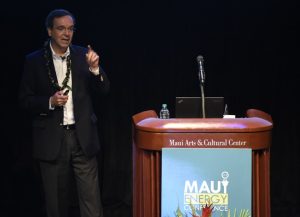
Keynote Speaker Gil Penalosa
Penalosa launched the event with his talk on Creating Vibrant, Healthy, and Resilient Communities for All. “If you create a great city for an 8 year old and an 80 year old, you will create a successful city for all people.” he said. His innovative concept involves the use of more parks and sustainable mobility: walking, riding bicycles, and public transit.
“We seem to be facing a perfect storm of threats and challenges, but in every challenge lies opportunity,” Penalosa noted.
“How we plan, build and cultivate a healthy city life for people of all ages, abilities, and socio-economic backgrounds have never been more important than it is today. As Hawaii pursues efforts to reduce its carbon footprint in the electricity and transportation sectors there are opportunities to build healthier, happier communities.”
Panel’s Discuss the Future for Energy
A panel discussion on Emerging Trends in Hawaii Energy Policy offered a look into Maui County’s current situation. Maui Mayor Alan M. Arakawa noted that last year’s study, the Guernsey Report, suggested the county should work with a private company to take over the electric grid from Maui Electric.
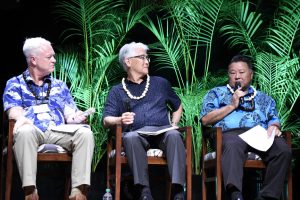
Mayor Alan Arakawa discusses the Emerging Trends in Hawaii Energy Policy with Alan Oshima, Hawaii Electric Company and Doug McLeod, Conference Program Committee Chair.
“The study did its job and certainly made an impact on the industry,” said the Mayor. “We’re definitely still looking at alternatives. It was never about replacing MECO, it was about what can be most beneficial to the county. We’re still looking at different changes to the grid system and different types of energies. At the same time, the county has seen the electric company working with the community and exploring ways the community can generate their own electricity.”
Brian Kealoha, Hawaii Energy Executive Director said, “We’re excited to continue the dialogue about our state’s 100-percent clean-energy goal, including all the elements that need to be put into place in order to make that a reality. It’s important for stakeholders who set policy to be able to have these conversations, hear different ideas and strategies that may be available to us from around the globe, as well as learn from other working models. These discussions will help us make smarter energy decisions and focus on what we need to do as a state to accomplish our objectives.”
Hawaii Energy’s case study highlighted a few of their success stories that showcase their commitment to helping small businesses lower operating costs through energy efficiency. “Small businesses are the backbone of Hawaii’s economic vitality and resilience,” Kealoha said. “Through programs developed specifically for them, Hawaii Energy has already helped over 400 Maui County businesses become energy efficient before moving on to photovoltaics and energy storage.”
“Our energy future has to be viewed through the lens of security and resilience,” agreed Scott Seu, Senior Vice President, Public Affairs, Hawaiian Electric Company. “A secure and resilient nation is one with the capabilities required across the whole community to prevent, protect against, mitigate, respond to, and recover from the threats and hazards that pose the greatest risk.”
Shayna Decker, Director, Communications Maui Electric, observed, “As we continue to make progress toward our state’s clean energy goals, we recognize that changing the way we operate is essential. We also know that it will take everyone working together. The Maui Energy Conference provides the opportunity to network, learn and partner with other entities who share our vision — government leaders, businesses, community members and organizations, and environmental groups — to secure a clean-energy future for Hawaii.”
Decker added, “This year, the conference discussions went beyond electric energy and highlighted how energy, food, water, and transportation are intertwined. This presents all of us with tremendous opportunities to find solutions together to move us forward.”
About 50 speakers presented, debated and discussed the broad resilience theme over the three days. “Urban design dictates lifestyle, and lifestyle has a huge impact on people’s energy footprint,” said Jonathan Koehn, Conference Program Committee member and Regional Sustainability Coordinator of the City of Boulder. “There are so many ways that physical infrastructure around us influences our energy choices.”
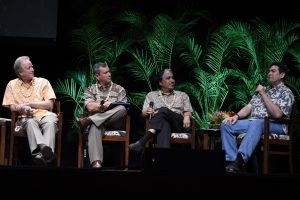
The Panel discusses the Water Energy Food Security Nexus L to R – Jeffrey Pearson, Rick Volner, Kyle Data and Paul Brewbaker
Koehn moderated a panel discussion featuring Paul Brewbaker of TZ Economics, Kyle Datta of Ulupono Initiative, Jeffrey Pearson of the state Commission on Water Resource Management and Rick Volner, General Manager of diversified agriculture for A&B. The panel explored the nexus between agricultural production, water use, and energy production.
Volner said, “With the successful closure of sugar operations in 2016, A&B is currently implementing diversified agricultural and renewable-energy opportunities on the former sugarcane land. For example, we are looking at raising cattle and working with local farmers, besides developing renewable-energy projects.”
Kyle Datta of Ulupono Initiative said, “Hawaii is just beginning a critical conversation about the role of water in energy resiliency and sustainability. When sugar was cultivated, agriculture used the majority of surface water on Maui. We mined our groundwater reserves to meet our needs.”
“Our current course is unsustainable,” Datta noted. “We supply very little local food but 26 percent renewable energy with marginal business models from a prior century. What is the cost-benefit of reinvesting in watersheds?” he asked.
Theodore Peck, Executive Officer and Lead Developer of Holu Energy, presented two case studies of commercial on-grid microgrids operational in Hawaii with third-party ownership, integrating photovoltaics and energy storage systems to create multiple value streams on both sides of the meter.
“The days of reviewing a single utility bill are over,” Peck said. “A fully integrated distributed energy resource ecosystem provides value to all stakeholders. Synchronization is the game-changer in energy technology.”

Terawatt Sponsor HNU Energy launched HiVE energy storage at the 2017 Maui Energy Conference
Various panels investigated the strategies required to secure reliable, safe and affordable energy as an entire system. Resilience was also the thread that wove together various dimensions of the discussion when nuclear energy as a ‘clean’ energy source was discussed.
“Whatever your objective is, the argument that nuclear energy is more friendly to the environment is being made across the US,” explained Program Committee Chair Doug McLeod. “We wanted our audience to be familiar with the arguments being made at the national level, and then add a layer of Hawaii-specific information related to our constitutional provision.”
“Building nuclear plants is a tough task anywhere in the US,” said Gavin Bade, Associate Editor, Utility Dive and moderator of the panel on Emerging Trends in Nuclear Energy Policy.
“However, Hawaii’s constitutional limitations and public sentiment against the technology make the task an even tougher one in the Aloha State,” Bade said. “This year’s expert panelists agreed that if nuclear ever is to come to the state, it will likely be in the form of small modular reactors of less than 50 megawatts. While these technologies are currently in development, panelists concurred they are at least a decade from commercialization. As such, there is likely not a role for nuclear on the islands for at least the next ten years.”
A Shift in Energy
An invited presentation by featured speaker Michelle Wyman, Executive Director, National Council for Science and Environment (NCSE), set the tone for the discussion on day two of the conference.
“This year marks a shift in the political landscape that presents opportunities and challenges at all levels of government,” said Wyman. “The energy sector, already rife with change, can benefit significantly from the strength that science provides.”
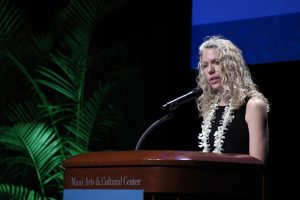
Michelle Wyman, National Council for Science and Environment
Wyman discussed the alignments between energy, science and policy, and offered insights into pursuing those. “We are living in a world of turbulent change, chaotic and unpredictable,” she explained. “Still, we are resilient by design. We need to use our environmental and scientific knowledge to make our decisions in the gateway to resilience, which is the capacity to adapt to changing conditions and impacts such as intense storms, droughts, and wildfires. Resilient design is a response to our vulnerabilities. Communities need to adapt and survive. This is why we need a new business paradigm.”
Another draw for this year’s Conference was Carol Sim, Director of Environmental Affairs, Alaska Airlines. Sim has been instrumental in developing Alaska Air’s formal sustainability program and establishing emission reduction goals, including use of a new sustainable, alternative jet fuel made from forest residuals. Sim joined the panel discussion on Innovations in Transportation, which looked at what steps can be taken to create and facilitate a resilient transportation sector.
“Commercial aviation accounts for less than two percent of the carbon dioxide emissions in the US and only about two percent globally,” said Sim. “While that percentage may seem low, aviation emissions are highly visible and are projected to increase with industry growth. Our project managed Alaska Airline’s 75 biofuel flights in 2011 and 2016, and has adopted other aggressive goals for reducing greenhouse emissions.”
Cheryl Roberto of Twenty First Century Utilities, an investment utility firm in Washington DC, was part of a panel of experts asked what they thought the energy industry might look like in 25 years. “Utilities have been the backbone of energy transformation and will continue to be, but their role is evolving,” Roberto said. “They won’t be the sole provider anymore. Instead there will be a platform for integrating all the energy services out there as a market innovator.”
The Energy Conference concluded with a Sustainability Workshop hosted by MEDB, Maui Brewing Company, and the Maui High Performance Computing Center (MHPCC) in Kihei. Maui’s energy challenges have triggered creative solutions in business, military operations, and education.
The 2017 Maui Energy Conference provided several threads that may be explored in future conferences as stakeholders from our local community, the nation, and the world will once again meet on the Island of Maui to help shape new solutions to the many energy challenges we face.
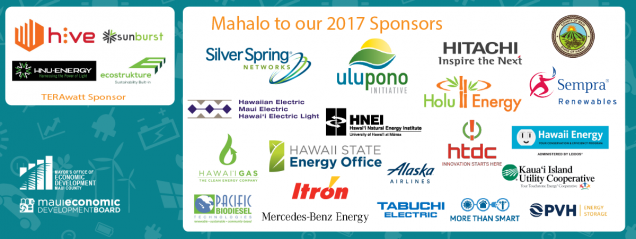

 This looks like a fundamental shift in how the Commission assesses the environmental impacts of producing energy in Hawaii. According to Conference Chair Doug McLeod: “The question is now whether the traditional ‘reasonable and prudent standard’ drives one to the conclusion that prudent people don’t want to make electricity in ways that might speed up climate change”. Sea change, game change, whatever type of change analogy you like – from a regulatory standpoint this is very different than where we were a few years ago.
This looks like a fundamental shift in how the Commission assesses the environmental impacts of producing energy in Hawaii. According to Conference Chair Doug McLeod: “The question is now whether the traditional ‘reasonable and prudent standard’ drives one to the conclusion that prudent people don’t want to make electricity in ways that might speed up climate change”. Sea change, game change, whatever type of change analogy you like – from a regulatory standpoint this is very different than where we were a few years ago.



 With the program for the 2018 Maui Energy Conference taking shape, we can share some more details with you.
With the program for the 2018 Maui Energy Conference taking shape, we can share some more details with you.







